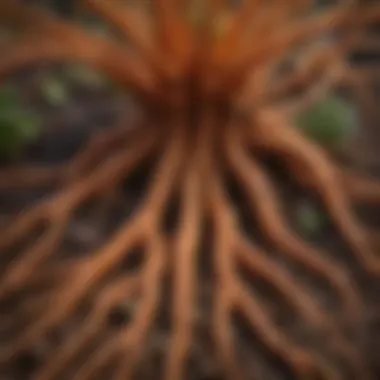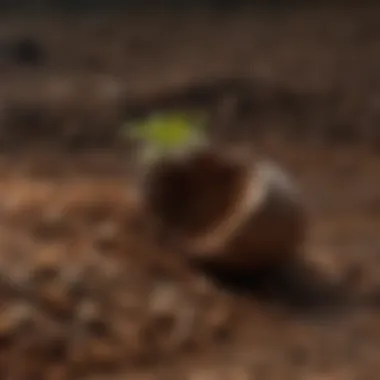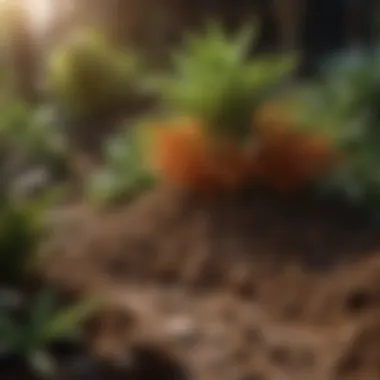Maximizing Plant Growth with Fox Farm Coco Perlite


Intro
Fox Farm Coco Perlite is increasingly becoming a chosen substrate in horticulture, prized for its unique properties. The substrate represents an innovative blend of coconut coir and perlite, offering an optimal environment for plant growth. Understanding the characteristics and capabilities of this medium is essential for gardeners and farmers alike. It influences not only plant health but also the overall horticultural practices implemented in various settings.
In the subsequent sections, we will explore the latest trends in agriculture, sustainable practices that align with modern environmental needs, and practical gardening techniques. This exploration aims to provide a comprehensive perspective on the role of Fox Farm Coco Perlite in enhancing horticultural practices.
Latest Trends in Agriculture
Overview of Current Trends
The agricultural landscape is evolving rapidly. A shift toward sustainable practices is observed alongside advancements in technology. More farmers are adopting substrates like Fox Farm Coco Perlite to improve soil health and plant performance.
This growing trend reflects a broader awareness of environmental impacts. Modern farmers are increasingly interested in organic solutions that not only support plant growth but also minimize ecological footprints. The integration of various substrates into gardening practices aligns with these goals.
Impact of Technology on Farming Practices
Technology's role in agriculture cannot be overstated. Tools for soil testing and monitoring are now commonplace. Data analytics help farmers make informed decisions regarding crop management. This integration of technology enhances the efficacy of growing mediums like Fox Farm Coco Perlite.
Soil health monitoring technologies ensure that coco perlite is utilized to its full potential. These practices guide farmers in optimizing conditions for crops and assessing the effectiveness of various substrates.
Sustainable Practices: Towards a Greener Future
Importance of Sustainability in Agriculture
Sustainability is no longer a choice but a necessity in agriculture. As the global population rises, so does the demand for sustainable food production. Fox Farm Coco Perlite can contribute by improving water retention, reducing the need for fertilizers, and limiting environmental degradation.
Methods for Sustainable Farming
Sustainable farming encompasses a variety of approaches. Key methods include:
- Crop Rotation: Preventing soil depletion by alternating crops.
- Organic Inputs: Utilizing natural fertilizers and amendments.
- Water Management: Efficient irrigation systems that conserve water.
Fox Farm Coco Perlite supports these sustainable methods by enhancing soil structure and allowing for better air and water movement.
Gardening Techniques and Tips
Essential Gardening Tools and Equipment
For successful gardening, having the right tools is critical. Essential items include:
- Spades: For digging and loosening soil.
- Trowels: Helpful for planting and transplanting.
- Pruners: Necessary for maintaining healthy plants.
These tools facilitate efficient use of substrates like Fox Farm Coco Perlite, ensuring that the medium is applied correctly to maximize its benefits.
Seasonal Gardening Practices
Gardening requires an understanding of seasonal needs. During warmer months, the focus should be on ensuring moisture retention. Fox Farm Coco Perlite can support this by creating an ideal balance of drainage and retention. Conversely, in cooler months, attention shifts towards protecting plant roots from frost.
Successful gardening integrates knowledge of substrates like Fox Farm Coco Perlite with effective tools and seasonal practices.
Prelims to Fox Farm Coco Perlite
Understanding the significance of Fox Farm Coco Perlite in horticulture is essential for any farmer or gardener seeking to optimize plant growth. This substrate has gained recognition due to its unique composition, which includes both coconut coir and perlite. These two components work in harmony to provide an ideal environment for root health and development.
Fox Farm associates itself with high-quality horticultural products. Their reputation for delivering sustainable gardening solutions is well-known. This brings us to the primary benefits of using their Coco Perlite blend.
Overview of Fox Farm Products
Fox Farm offers a wide range of products tailored for different gardening needs. Each of their items is designed to support the life cycles of plants, focusing on providing the best nutrients and conditions for growth. From soils and fertilizers to a range of additives, these products are often favored among hobbyists and professionals alike. They often feature organic ingredients, making them suitable for various gardening approaches, including organic growing. The company emphasizes eco-friendly practices, which is a point of appeal to many users.
Understanding Coco Coir and Perlite


Coconut coir is a natural fiber extracted from the husk of coconuts. It is a sustainable choice compared to peat moss. This material offers excellent moisture retention, while still allowing adequate drainage, which is critical for preventing root rot.
Perlite, on the other hand, is an inert volcanic glass that improves aeration in the soil. It enhances drainage, preventing water sedimentation that can lead to various plant diseases. When combined, coco coir and perlite create a substrate that supports both moisture retention and aeration. This combination is particularly beneficial for young plants and seedlings, offering a well-balanced environment for growth.
"The synergy between coconut coir and perlite significantly improves the growing conditions for plants, making Fox Farm Coco Perlite a strong choice for modern horticulture."
In summary, the composition of Fox Farm Coco Perlite, along with the brand's commitment to quality, makes it a notable substrate in the horticultural sector. Understanding its components and the philosophy behind Fox Farm's product line can aid in making informed choices for gardening or agricultural needs.
Composition of Fox Farm Coco Perlite
The composition of Fox Farm Coco Perlite is vital in understanding how it supports effective plant growth in horticulture. This substrate combines two key elements: coconut coir and perlite. Each component contributes unique properties that enhance overall performance, making it especially appealing to gardeners and agricultural professionals.
Coconut Coir Characteristics
Coconut coir is derived from the fibrous husk of coconuts. It is an organic material known for its excellent water retention and aeration properties. One of the main characteristics of coir is its ability to hold moisture. This property ensures that plants receive a consistent supply of water. Furthermore, coconut coir is rich in lignin, which helps improve soil structure over time, making it beneficial for plant root development.
Another important feature of coconut coir is its biodegradability. It decomposes slowly compared to other organic materials, meaning it can provide long-lasting support for plants. Additionally, it has a neutral pH level, which makes it suitable for a wide range of plants. Unlike peat moss, coir is a sustainable alternative that does not deplete natural resources, adding an eco-friendly aspect to its use.
The Role of Perlite
Perlite is a naturally occurring volcanic glass that undergoes a heating process to expand and become lightweight. It is primarily used to improve aeration and drainage in growing mediums. The granulated structure of perlite creates air pockets within the substrate, allowing for optimal root oxygenation. This ability to provide aeration is crucial for preventing root rot and promoting healthy plant growth.
The inclusion of perlite in Fox Farm Coco Perlite also enhances the substrate’s drainage capabilities. Excess water can easily flow through, preventing water-logged conditions that can harm plants. This balance between water retention and drainage creates an ideal environment for various plant types, from vegetables to ornamental species.
In summary, the composition of Fox Farm Coco Perlite, featuring coconut coir and perlite, offers several benefits. Together, these elements create a growing medium that promotes healthy plant growth through moisture retention, aeration, and sustainability.
A thoughtful combination of coconut coir and perlite lays the groundwork for improved plant growth, making Fox Farm Coco Perlite a noteworthy choice for horticulturists.
Benefits of Using Fox Farm Coco Perlite
The use of Fox Farm Coco Perlite in horticulture brings multiple advantages that merit thorough examination. This section elaborates on how this innovative substrate serves as a crucial component in enhancing plant growth and overall gardening success. Understanding these benefits helps not just professional growers but also enthusiasts seeking effective and sustainable methods in their gardening practices. Below, we explore key benefits such as enhanced aeration, superior water retention properties, and sustainability aspects of using Fox Farm Coco Perlite.
Enhanced Aeration
Aeration is vital for healthy root development in plants. Fox Farm Coco Perlite facilitates increased aeration thanks to its unique texture and composition. The combination of coconut coir and perlite creates air-filled pore spaces within the substrate, allowing roots to access oxygen more freely. This aspect is particularly important in container gardening and hydroponic systems where soil compaction can occur easily. By improving aeration, growers can significantly reduce the risk of root rot and diseases that thrive in poorly oxygenated environments.
Moreover, sufficient aeration supports overall microbial health. Beneficial microorganisms help in nutrient uptake and promote a balanced ecosystem within the substrate, leading to thriving plants.
Water Retention Properties
Another significant advantage of Fox Farm Coco Perlite is its remarkable water retention capacity. The coir in the mix can retain moisture effectively while maintaining drainage. This dual ability ensures that the growing medium does not become waterlogged, which can be detrimental to plant health. Proper moisture management is fundamental for optimal growth and productivity, especially in arid climates or during dry spells.
Growers can optimize their watering routines, reducing frequency while assuring adequate hydration for the plants. The balanced moisture retention also leads to healthier root systems, as roots can access water as needed without the fear of drowning.
Sustainability Aspects
Sustainability is a growing concern in horticulture, and Fox Farm Coco Perlite presents a more eco-friendly option compared to traditional substrates like peat moss. The use of coconut coir, a byproduct of the coconut industry, utilizes material that would otherwise go to waste. This practice reduces the environmental footprint associated with sourcing raw materials for growing mediums. Moreover, the production and use of Fox Farm Coco Perlite support sustainable agriculture by contributing to regenerative practices.
Incorporating sustainable options in gardening not only promotes better environmental practices but also provides a sense of responsibility towards future generations. Gardeners can feel confident knowing they are making informed choices that support both plant health and the planet.
"The integration of sustainable substrates in horticulture open doors to practices that prioritize ecosystem health while maximizing plant growth and yield."
Applications in Horticulture
The application of Fox Farm Coco Perlite in horticulture is significant. This substrate provides a versatile medium that caters to various gardening methods. Understanding its application is crucial for optimizing plant growth. As many enthusiasts and professional gardeners search for efficient growing solutions, a focus on this topic will highlight important benefits and considerations.
Soil-less Gardening
Soil-less gardening is becoming a preferred choice for many growers. With the use of Fox Farm Coco Perlite, plants can thrive outside traditional soil environments. Coco coir provides a stable base, while perlite enhances aeration. This combination increases root health and boosts nutrient absorption.
Additionally, soil-less systems are less susceptible to pests and diseases often present in conventional soil. Therefore, gardeners can manage a cleaner growing space. The lightweight nature of this mixture allows for easier handling and mobility. However, careful monitoring of pH and nutrient levels is essential, given that the medium does not retain nutrients as soil does.
Container Gardening Considerations


Container gardening presents its own set of challenges and benefits. Using Fox Farm Coco Perlite in this context enhances drainage, preventing waterlogging. This is essential, as container plants are prone to root rot if overwatered. The air-filled porosity of the perlite supports optimal root development, allowing the plants to grow strong and healthy.
Another critical aspect to consider is the size of the containers being used. Smaller pots may require more frequent watering due to the medium's excellent drainage properties. Maintaining moisture levels is vital for plant growth. Ensuring correct mixing ratios of Coco Coir and Perlite can help achieve a better balance between drainage and moisture retention.
Hydroponics Framework
In the realm of hydroponics, Fox Farm Coco Perlite serves as an ideal substrate. Hydroponic systems focus on delivering nutrients directly to plant roots through water. The use of Coco Perlite offers a stable structure for plants, preserving essential moisture while allowing excess water to drain away. This balance is crucial for maintaining healthy roots and avoiding water stress.
For those new to hydroponics, this mixture can simplify the process. Its pH neutrality means it won't adversely affect nutrient solution quality. It also supports beneficial microbial life, which can enhance plant resilience. Hence, when considering substrates for hydroponic use, Fox Farm Coco Perlite stands out as a viable option.
"The synergy of Coco Coir and Perlite in hydroponic systems fosters robust growth, making it a popular choice among horticulturists."
In summary, the applications of Fox Farm Coco Perlite in horticulture are extensive. Each gardening method, whether soil-less, container-based, or hydroponic, benefits from its unique properties. Understanding these applications helps farmers and horticulture enthusiasts optimize their gardening practices.
Comparative Analysis with Other Substrates
In horticulture, choosing the right growing medium is crucial. The efficacy of Fox Farm Coco Perlite can be better appreciated when compared to other substrates such as peat moss and vermiculite. This analysis ensures gardeners and farmers understand their options. By identifying strengths and weaknesses, enthusiasts can select the most suitable substrate for their specific needs. Moreover, understanding these alternatives can influence sustainability practices and overall plant health.
Coco Coir vs. Peat Moss
Coco coir and peat moss are both popular substrates in horticulture. However, they differ in several key aspects.
- Sustainability: Coco coir is derived from coconut husks, making it a renewable resource. In contrast, peat moss is harvested from peat bogs, which can take thousands of years to form. This raises concerns about ecological impact with peat extraction.
- Chemical Properties: Coco coir has a neutral pH level, which offers benefits for many plants. Peat moss, while acidic, can be beneficial for acid-loving plants but might not suit all species.
- Water Retention: Both mediums have good water retention, but coco coir holds moisture better when mixed with perlite. This combination enhances aeration and drainage, which is a common requirement for many plants.
"The choice between coco coir and peat moss can significantly impact plant health and environmental sustainability."
- Nutrient Retention: Coco coir typically has a higher cation exchange capacity than peat moss. This means it can hold nutrients more effectively, allowing for better nutrient availability to plants.
Perlite vs. Vermiculite
When discussing perlite and vermiculite, it’s important to understand their distinctive features and uses.
- Aeration: Perlite is known for its excellent aeration properties. Its lightweight nature encourages drainage, making it ideal for soil-less mixes. Vermiculite, while also promoting aeration, retains more moisture, making it suitable for plants that prefer wetter conditions.
- Thermal properties: Vermiculite has superior insulating properties compared to perlite. This can be essential in maintaining consistent temperatures for seed germination.
- Nutrient Retention: Vermiculite retains nutrients better than perlite due to its capacity to hold water and nutrients. This feature can benefit plants that require steady nutrient input during their growth cycle.
Both perlite and vermiculite can be used in combination with substances like coco coir for enhanced results in horticulture. In terms of sustainability, perlite is naturally occurring but does require processing. Vermiculite is mined and can have similar environmental concerns as perlite, albeit to a lesser extent.
In summary, understanding these comparisons helps gardeners choose the right medium according to their specific horticultural needs. Each substrate serves a purpose, but their effectiveness can vary greatly depending on the goals of the grower.
Proper Usage Guidelines
In the realm of horticulture, utilizing substrates like Fox Farm Coco Perlite effectively is paramount for plant health and yield. Proper usage guidelines are not merely recommendations; they are essential practices that determine the success of gardening and farming endeavors. Developing a thorough understanding of these guidelines helps growers maximize the benefits provided by this growing medium, ensuring optimal growth conditions for plants.
Mixing Ratios for Optimal Results
Achieving the right balance between components in a growing medium can significantly enhance plant performance. For Fox Farm Coco Perlite, a common mixing ratio is 70% coconut coir to 30% perlite. This ratio supports excellent moisture retention due to the coir, while the perlite contributes to necessary aeration and drainage. Adjustments may be necessary based on specific plant types or environmental conditions.
- Considerations for Different Plants:
- Cacti and Succulents: These often benefit from a drier mix, so consider approaching a 50/50 ratio of coir to perlite.
- Ornamental Plants: A higher coir content works well for moisture-loving varieties, provided you maintain adequate drainage.
The right mixing ratios can lead to better root health, enhanced nutrient uptake, and overall improved plant vigor.
Watering Techniques
Watering is a critical aspect of growing with any substrate, including Fox Farm Coco Perlite. Water retention is excellent due to the coir, but overwatering can become an issue, leading to root rot. Here are some guidelines to follow:
- Frequency of Watering: A general rule is to water when the top inch of the medium feels dry to the touch. This can mean watering every few days or weekly, depending on climate and plant requirements.
- Water Distribution: When watering, ensure an even distribution throughout the coconut coir and perlite mix.
- Monitoring: Check for signs of over or under-watering. Yellowing leaves may indicate too much water, while wilting may signify insufficient moisture.
Finding the right scheduling for watering can optimize plant health, ensuring adequate moisture without creating harmful conditions.
Fertilization Needs


Fertilization is essential when using Fox Farm Coco Perlite since the substrate itself has limited nutrient content.
- Choosing Fertilizers: Use a balanced fertilizer, ensuring it provides all essential macro and micronutrients. Organic options like fish emulsion or bone meal are popular among gardeners aiming for sustainable practices.
- Timing of Application: Fertilization should coincide with the plant's growth stages. During active growth, a bi-weekly or monthly feeding can sustain healthy development.
- Avoiding Over-Fertilization: It's crucial to follow package recommendations closely. Over-fertilization can harm plants and create nutrient imbalances.
In summary, understanding the proper usage guidelines for Fox Farm Coco Perlite, including mixing ratios, watering techniques, and fertilization needs, can significantly impact plant success. Integrating these practices will help gardeners and farmers achieve the desired results in their horticultural pursuits.
Potential Drawbacks and Considerations
While Fox Farm Coco Perlite offers several advantages in horticulture, it is essential to examine some potential drawbacks and considerations before fully committing to its use. Understanding these issues can help growers make informed choices about their substrates and optimize their gardening practices.
Nutrient Retention Challenges
One of the significant challenges with Fox Farm Coco Perlite is its ability to retain nutrients. Unlike traditional soil, which serves as a natural reservoir for essential minerals, this substrate may require additional management to ensure that plants receive adequate nutrition.
Coconut coir can hold some nutrients, but its effectiveness diminishes over time. The perlite component does not retain nutrients as well, leading to scenarios where plants may exhibit nutrient deficiencies. Growers using this substrate must be vigilant.
Here are some strategies to address nutrient retention challenges:
- Regular Fertilization: Implement a consistent fertilization schedule to supply essential nutrients that might be washed away.
- Use of Slow-Release Fertilizers: Enrich the mix with slow-release fertilizers that provide a steady supply of nutrients over time.
- Monitor pH Levels: Testing the pH level of the growing medium can identify nutrient availability and deficiencies to adjust nutrient supplies accordingly.
Regular monitoring and proactive nutrients management are key for successful crop yields.
Environmental Impact of Sourcing
Another important consideration is the environmental impact associated with the sourcing of coconut coir and perlite. While both materials have gained popularity for being lightweight and effective, the extraction processes can have environmental consequences.
For instance, coconut farming may contribute to habitat destruction and biodiversity loss. If sourcing is not done sustainably, it may lead to deforestation in some regions.
Moreover, the mining of perlite involves significant energy consumption and carbon emissions. These factors raise questions about the sustainability of these substrates in an era where eco-friendly practices are critical for the future.
To mitigate these issues, growers should consider:
- Sourcing Sustainably: Seek products from suppliers that practice sustainable harvesting and environmentally friendly extraction methods.
- Selecting Local Sources: Whenever possible, use locally sourced materials to reduce transport emissions and support the regional economy.
- Educating on Responsible Practices: Stay informed about best practices in substrate sourcing to better contribute to environmental conservation efforts.
Future Directions in Horticultural Substrates
The horticulture industry is constantly evolving. Understanding the future directions in horticultural substrates is vital for growers looking to enhance their plant cultivation practices. As the demand for sustainable and efficient growing mediums increases, innovations in materials and techniques are emerging. This awareness and adaptation can significantly impact plant health, yield, and environmental sustainability.
Innovations in Coconut Coir
Coconut coir has increasingly become a popular choice among horticulturists. One key innovation is the development of coir products that are more finely processed, enhancing their usability as a substrate. These advancements improve aeration and moisture retention, crucial for plant roots. Furthermore, manufacturers are exploring different ways to integrate nutrients into coir before it reaches the consumer, presenting a more balanced mix for plants from the start.
Additionally, some growers are experimenting with treated coir, which can offer tailored pH levels suited for specific plant types. For example, adjusting the coir's pH can enhance nutrient uptake for acid-loving plants. This ability to customize substrate characteristics represents a significant leap towards precision horticulture.
Emerging Trends in Eco-Friendly Materials
The interest in eco-friendly materials is growing rapidly within horticulture. Various options are being tested to reduce the environmental impact of traditional substrates. For instance, grow mats made from recycled textiles or biodegradable options made from agricultural waste are on the rise. These materials align with sustainability goals while providing effective growing conditions.
"Adopting eco-friendly materials is no longer a trend; it is becoming a necessity for responsible horticulture."
Moreover, a focus on local sourcing of materials continues to emerge. This practice reduces carbon footprints associated with transportation and supports local economies. Exploring local alternatives is gaining traction as farmers seek to minimize their ecological impact.
The End
The conclusion of this article underscores the multifaceted significance of Fox Farm Coco Perlite in the realm of horticulture. This substrate not only enhances seedling growth but creates an ideal environment for mature plants as well. It stands out due to its unique combination of coconut coir and perlite, thereby addressing common challenges faced by gardeners and agriculturalists.
From its superior aeration benefits to impressive water retention capabilities, Fox Farm Coco Perlite proves to be a valuable addition to various horticultural practices. The substrate not only supports robust root development but also aids in minimizing the risks of overwatering.
Finally, as the demand for sustainable gardening solutions continues to rise, understanding the integration of materials like Fox Farm Coco Perlite becomes crucial. The potential drawbacks, such as nutrient retention challenges, also warrant careful consideration. This ensures that users can maximize the benefits while mitigating any limitations encountered in the field.
Summary of Key Takeaways
The essential points regarding Fox Farm Coco Perlite are as follows:
- Composition: A mixture of coconut coir and perlite provides optimal growing conditions.
- Advantages: Offers enhanced aeration, excellent water retention, and contributes to sustainable gardening practices.
- Applications: Suitable for soil-less gardening, container gardening, and hydroponics.
- Comparative Insight: Compared to others like peat moss, it shows distinct benefits in terms of sustainability and usability.
- Usage Tips: Adhering to proper mixing ratios and watering techniques will improve outcomes significantly.
Final Thoughts on the Use of Fox Farm Coco Perlite
Hence, thorough research and preparation can elevate user experience and outcomes in gardening. The continuous innovations in the realm of horticultural substrates lend credence to the sustained relevance of products like Fox Farm Coco Perlite, making it worthwhile for any serious gardener.







